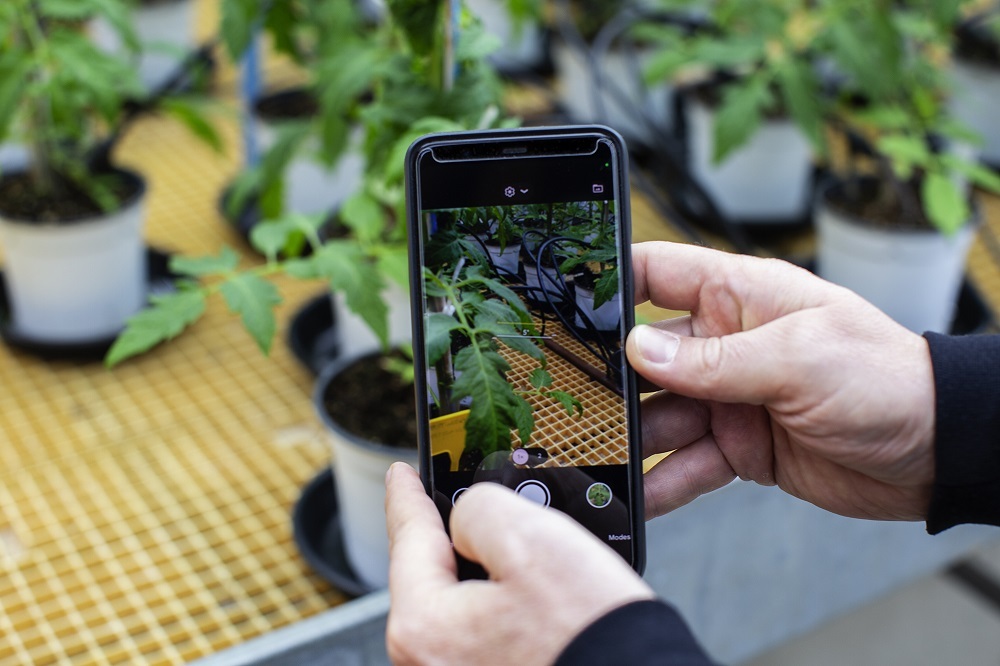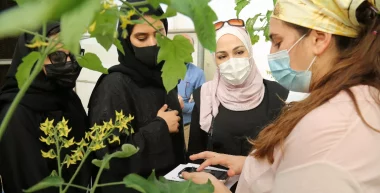
An app to identify crop disorders and recommend potential treatments in the Middle East and North Africa
The application has been created by the Crop Ecophysiology team from the University of Barcelona and researchers from the International Center for Biosaline Agriculture (ICBA) in Dubai
(Year 2023)
As part of a project funded by the International Center for Biosaline Agriculture (ICBA) in Dubai, the University of Barcelona (UB) together with researchers from ICBA have developed a mobile application aimed at small farmers in Egypt, Tunisia and the United Arab Emirates (UAE) which allows identifying crop disorders and recommending potential treatment in the targeted countries.
The app is called Dr. Nabat. The Crop Ecophysiology team of the Department of Evolutionary Biology, Ecology and Environmental Sciences, led by Dr. José Luis Araus, with the participation of Drs. Shawn C. Kefauver and José Armando Fernández-Gallego and doctoral student Luisa Buchaillot, have been the promoters within the UB. The interlocutor at the ICBA has been Dr. Henda Mahmoudi, plant physiologist and project leader.
Dr. Nabat’s goal is to improve food security and reduce crop losses, and therefore to improve income, for smallholder farmers in the targeted countries (Egypt, Tunisia and UAE). The system uses an artificial intelligence algorithm to detect early plant disorders by farmers and guide them on how to address them effectively.
Dr. Nabat is an app available on Android that is agile and easy to use: the farmer captures an image of an affected plant from his crop and, immediately, the application issues a precise diagnosis that indicates what disorder it is and how can be thrown. In addition, it offers as a solution a phytosanitary treatment accepted by the standards of the European Union.
The app is already functional with the three horticultural species involved in the project and which are the most important in the targeted countries tomato, pepper and cucumber. The disorders considered include for each of these species the main diseases caused by viruses, bacteria and fungi, as well as pests and the most relevant abiotic stresses (drought, salinity and nutritional deficiencies). The goal set by the researchers is for the app to grow and be able to identify other crops, such as quinoa, a very promising herbaceous plant in the region, thanks to its nutritional quality and tolerance to salinity.
The ICBA joint research team at UB has worked in recent months on the preparation of a multilingual guide (English, Arabic, French) that indicates the most efficient ways to address these disorders and with the specific names of the plant protection products marketed in Tunisia, Egypt and the United Arab Emirates to deal with plant disorders.
Last December 12, the App was publicly launched at ICBA in a ceremony chaired by Her excellency Mariam bint Mohammed Almheiri, Minister of Climate Change and Environment of the United Arab Emirates, and Dr. Tarifa Alzaabi, Director General of the ICBA, and attended by VIP guests from different UAE governmental institutions and by members of the UB team.
A model for future apps
The knowledge gained to develop the recognition algorithms and their placement in an app format will allow the development of other applications for crops and specific problems.
These apps can be very useful as an early warning system for the presence of specific problems in crops. As a result of this innovation, it will be possible to reduce the applications of phytosanitary and other treatments on crops, reduce the environmental impact of agricultural practices, the healthiness (level of pollutants) of the products, and in turn, the economic impact, already which allows a much more accurate and specific control of the growth conditions.


